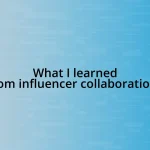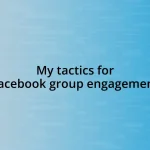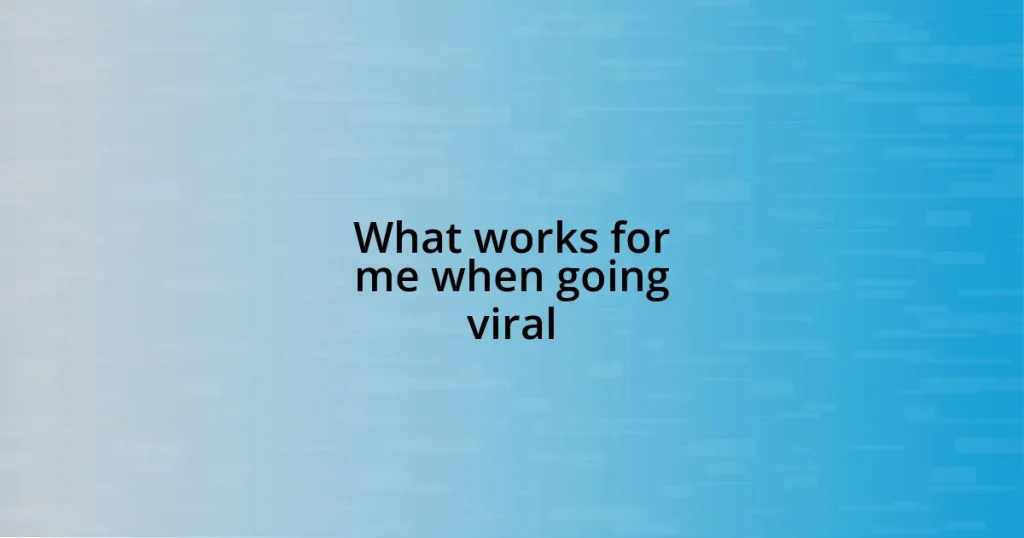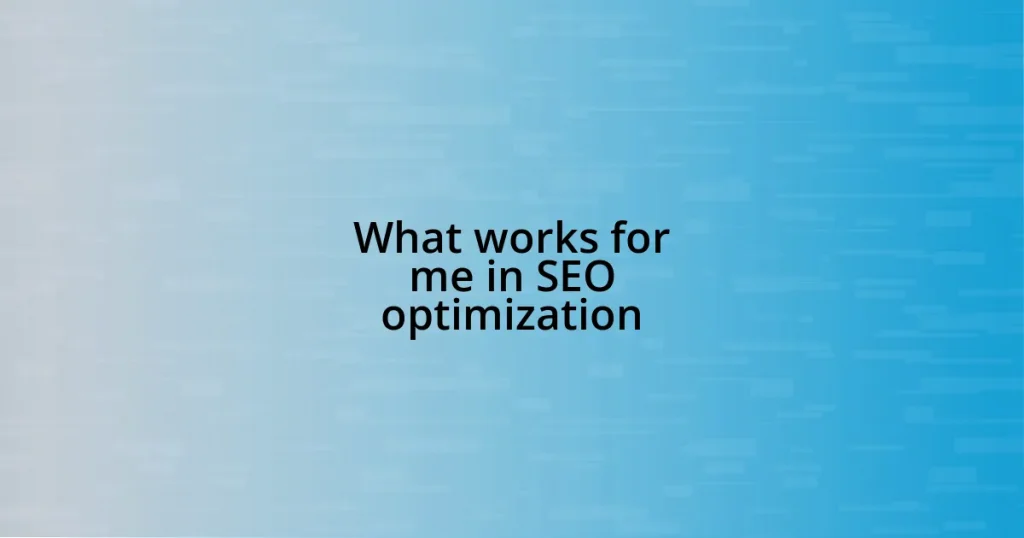Key takeaways:
- Social media algorithms curate content based on user behavior, which can create echo chambers and limit exposure to diverse perspectives.
- Engaging authentically and intentionally with content and audiences enhances visibility and promotes meaningful interactions.
- There are ethical concerns regarding privacy and the potential for algorithms to spread misinformation, highlighting the need for transparency and responsibility in their design.
- Users should be aware of how algorithms shape their experience, as reliance on familiar content can reduce spontaneity and discovery of new interests.

Understanding social media algorithms
Social media algorithms often seem like mysterious gatekeepers that determine what we see in our feeds. I remember the first time I genuinely felt frustrated with an algorithm—I was looking for inspiring travel photos, and instead, I kept getting bombarded with ads and posts that didn’t resonate with me. Have you ever felt that disconnect between your interests and the content served to you?
Understanding how these algorithms work can feel like cracking a code. They analyze our behavior—likes, shares, and even the time we spend on posts—to curate content tailored for us. I often wonder, to what extent do we sacrifice the joy of surprise and discovery for the sake of relevance? Sometimes, I miss stumbling upon completely random yet fascinating content that I didn’t even know I wanted to see.
At their core, social media algorithms aim to maximize user engagement to keep users returning. However, this can create echo chambers, where we only see perspectives that reinforce our views. I personally believe that while these algorithms have their advantages, they can also limit our exposure to new ideas and diverse opinions, making it crucial to be aware of their influence on our online experience.
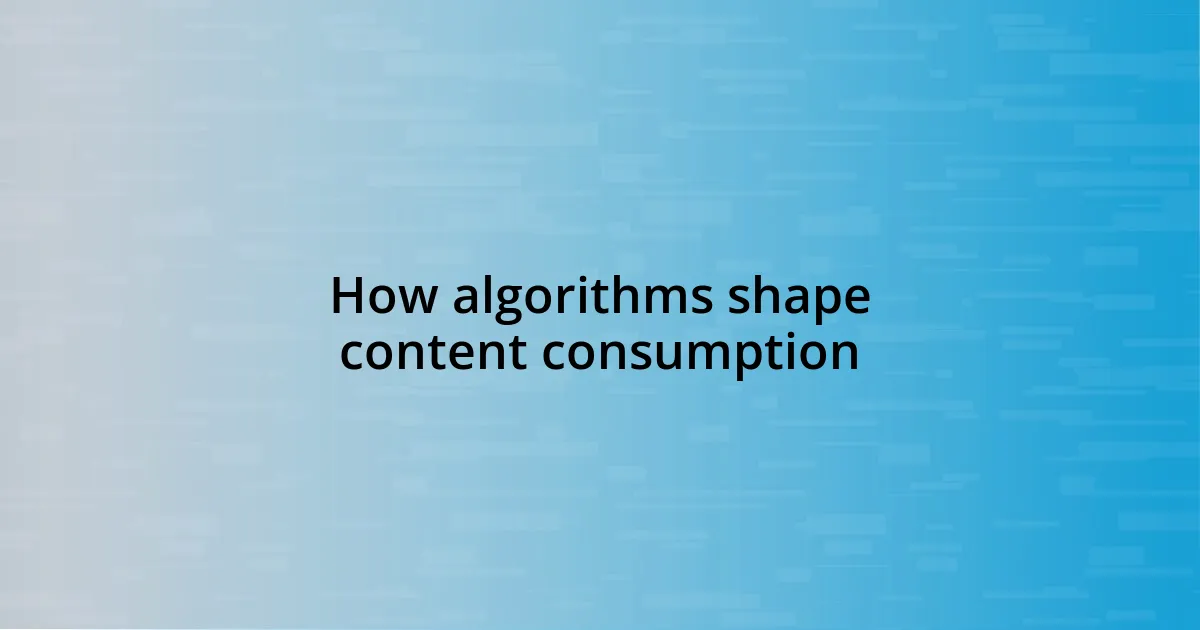
How algorithms shape content consumption
Social media algorithms play a critical role in shaping what content we consume daily. I’ve noticed that, even when I’m in the mood to explore new hobbies or interests, the algorithm tends to steer me back towards the same familiar themes. It’s almost like a digital comfort zone—safe and predictable, but where’s the excitement in that? Don’t you sometimes wish to scroll through a feed filled with unexpected delights?
The way these algorithms function isn’t arbitrary; they’re designed to optimize our engagement. I remember a time when, out of pure curiosity, I started liking posts about gardening. Instead of diversifying my feed, the algorithm locked me into an endless loop of plant care tips and gardening memes. Sure, I gained knowledge, but it made me realize how easily our interests can become one-dimensional under algorithmic influence.
Additionally, algorithms often prioritize content that generates immediate reactions, which can skew our perceptions of what is genuinely popular or valuable. Reflecting on my own feeds, I’ve seen how this can create pressure to conform to trending topics or viral challenges. It’s fascinating yet slightly disconcerting to think about how our digital experiences are curated in such a way that can limit our exposure to diverse narratives and ideas.
| Aspect | Impact on Content Consumption |
|---|---|
| User Engagement | Increased personalization leads to higher user retention but can narrow interests. |
| Diversity of Content | Algorithms may limit exposure to new ideas, reinforcing existing preferences. |
| Discovery | Reduced serendipity; users miss out on unexpected yet interesting content. |
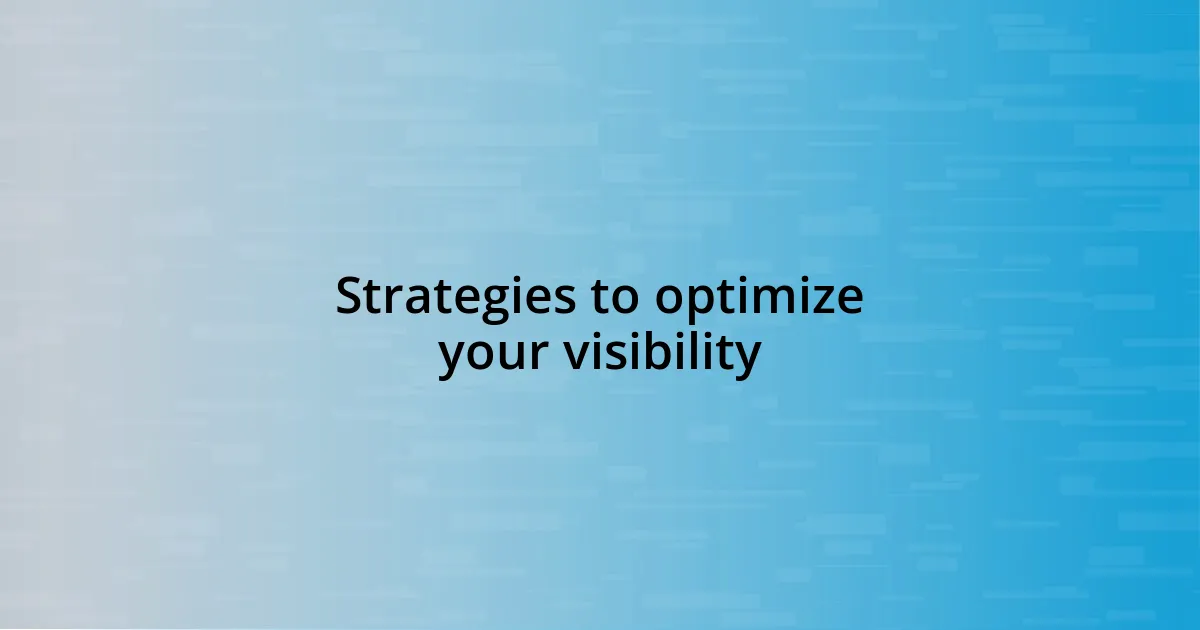
Strategies to optimize your visibility
To boost your visibility on social media, it’s important to engage intentionally with your audience. I’ve found that simply liking or sharing a post isn’t enough; genuine interaction is key. For instance, I remember when I took the time to comment thoughtfully on a friend’s creative project. The result? Not only did it spark a nice conversation, but my profile also gained some unexpected visibility among new connections. This taught me that being authentic in interactions can often open doors I never anticipated.
Here are some strategies to enhance your engagement and visibility:
- Post consistently: Regular activity keeps your content fresh and helps you stay top-of-mind.
- Leverage hashtags: Use relevant hashtags to tap into broader conversations and reach new audiences.
- Utilize stories and reels: These features often get prioritized in feeds, making them great for showcasing behind-the-scenes content.
- Engage with community content: Take the time to comment and share work from others in your field to foster relationships.
- Tailor your content: Analyze what resonates with your audience and customize your posts to reflect their interests and needs.
In my experience, some of the most satisfying interactions come when I share insights that resonate with others. I once posted a heartfelt reflection on a challenging project, and the response was overwhelming. People opened up about their struggles, sparking a powerful connection. It clarified for me that sharing authentic experiences can resonate deeply, often leading to increased engagement and visibility in a crowded space.
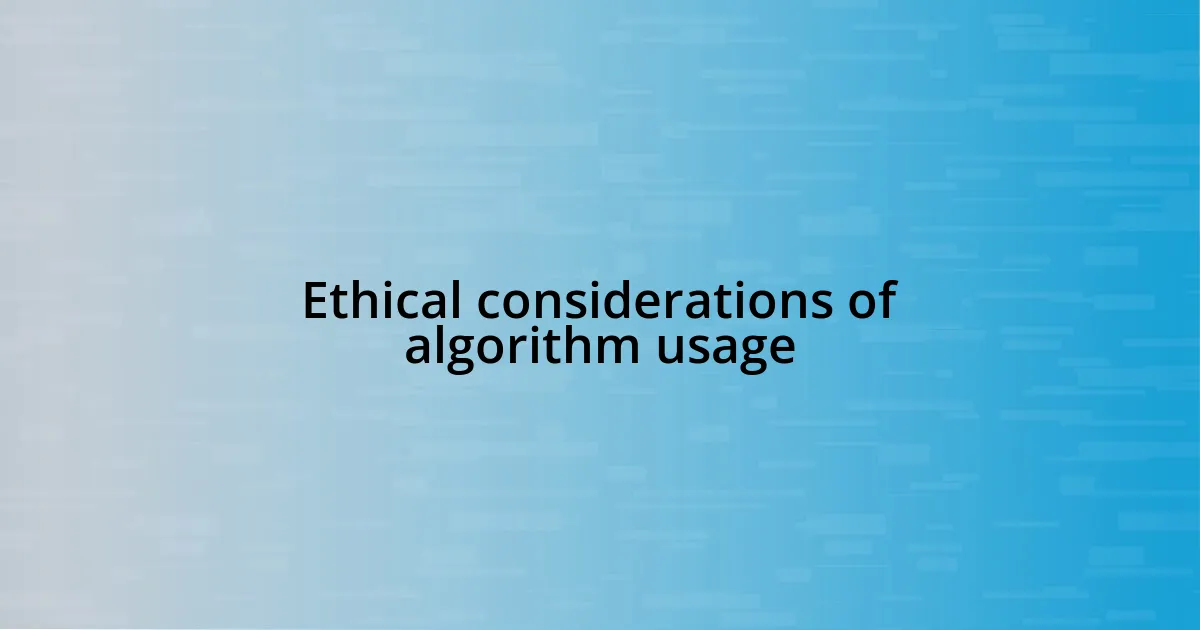
Ethical considerations of algorithm usage
The ethical implications of social media algorithms are a pressing topic I can’t overlook. I often think about how these algorithms can contribute to echo chambers, where individuals are only exposed to views that align with their own. It makes me wonder—are we losing the ability to engage with diverse perspectives? I know I’ve felt frustration when I encounter a post that challenges my stance, but I have to remind myself how essential these dialogues are for growth and understanding.
Another concern I’ve grappled with is privacy. Algorithms rely heavily on our data to tailor content, which raises questions about consent and trust. I recall a time when I received targeted ads for products I had just mentioned in a private conversation with friends; it left me feeling uneasy. This experience made me question: how much are we willing to sacrifice our privacy for convenience? It’s a delicate balance, and I believe it’s vital for platforms to be transparent about how our data is utilized.
Moreover, I also ponder the responsibility that comes with creating these algorithms. When creators prioritize engagement over ethical considerations, they risk amplifying harmful content or misinformation. I’ve seen firsthand how sensational headlines can dominate my feed; it’s disheartening. Could greater accountability and ethical design lead to healthier online environments? I truly believe we need a collective approach where users and developers work together to foster a more responsible digital landscape.








